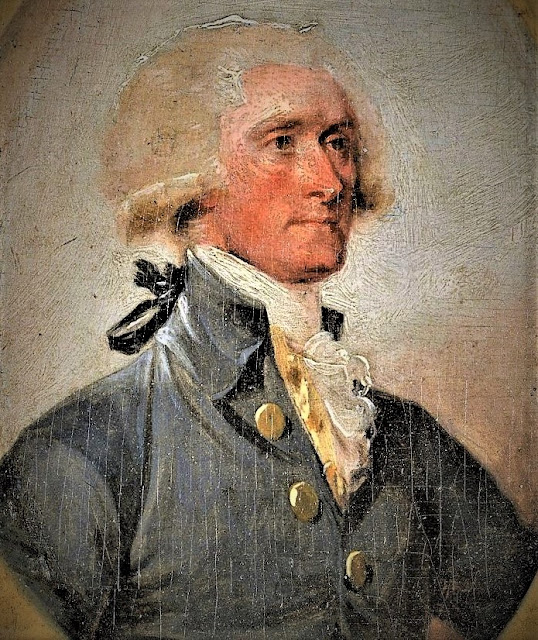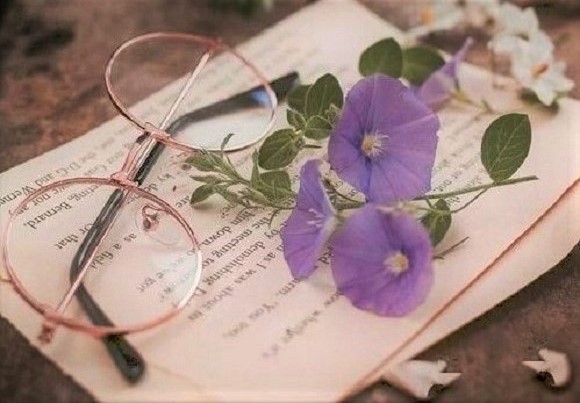Addicted to Plant Collecting
Thomas Jefferson (1743-1824) , April 22, 1800, letter to William Hamilton (1745-1813) “Among the many botanical curiosities you were so good as to shew me the other day, I forgot to ask if you had the Dionaea muscipula, & whether it produces a seed with you. if it does, I should be very much disposed to trespass on your liberality so far as to ask a few seeds of that, as also of the Acacia Nilotica, or Farnesiana whichever you have.”
William Hamilton (1745-1813) , October 30, 1805, letter to Thomas Jefferson (1743-1824) “my nephew Andrew Hamilton, will...deliver to you a small deciduous plant of the silk tree of Constantinople (Mimosa salibrisin) which if well preserved for two or three years in a pot, will afterwards succeed in the open ground. I have trees of 20 feet height which for several years past have produced their beautiful & fragrant flowers & have shewn no marks whatever of suffering from the severity of the last winter.”
Thomas Jefferson (1743-1824), November 6, 1805, letter to William Hamilton (1745-1813) “Your nephew delivered safely to me the plant of the Chinese silk tree in perfect good order, & I shall nurse it with care until it shall be in a condition to be planted at Monticello. mr Madison mentioned to me your wish to receive any seeds which should be sent me by Capt Lewis or from any other quarter of plants which are rare...I happen to have two papers of seeds which Capt Lewis inclosed to me in a letter, & which I gladly consign over to you, as I shall any thing else which may fall into my hands & be worthy your acceptance. one of these is of the Mandan tobacco, a very singular species uncommonly weak & probably suitable for segars. the other had no ticket but I believe it is a plant used by the Indians with extraordinary success for Curing the bite of the rattle snake & other venomous animals. I send also some seeds of the Winter melon which I recieved from Malta. some were planted here the last season, but too early. they were so ripe before the time of gathering (before the first frost) that all rotted but one which is stil sound & firm & we hope will keep some time. experience alone will fix the time of planting them in our climate, so that a little before frost they may not be so ripe as to rot, & still ripe enough to advance after gathering in the process of maturation or mellowing as fruit does. I hope you will find it worthy a place in your kitchen garden.”
Thomas Jefferson (1743-1824) , July 31, 1806, letter to William Hamilton (1745-1813) “Your favor of the 7th came duly to hand & the plant you are so good as to propose to send me will be thankfully rec’d. The little Mimosa Julibrisin you were so kind as to send me the last year is flourishing. I obtained from a gardener in this nbh’d 2 plants of the paper mulberry; but the parent plant being male, we are to expect no fruit from them, unless yours should chance to be of the sex wanted. at a future day, say 2 years hence I shall ask from you some seeds of the Mimosa Farnesiana or Nilotica, of which you were kind enough before to furnish me some. but the plants have been lost during my absence from home.
"I remember seeing in your greenhouse a plant of a couple of feet height in a pot the fragrance of which (from it’s gummy bud if I recollect rightly) was peculiarly agreeable to me & you were so kind as to remark that it required only a greenhouse, & that you would furnish me one when I should be in a situation to preserve it. but it’s name has entirely escaped me & I cannot suppose you can recollect or conjecture in your vast collection what particular plant this might be. I must acquiese therefore in a privation which my own defect of memory has produced, unless indeed I could some of these days make an impromptu visit to Phila. & recognise it myself at the Woodlands. . .
"...there is no one on which you would be received with more pleasure than at Monticello. Should I be there you will have an opportunity of indulging on a new field some of the taste which has made the Woodlands the only rival which I have known in America to what may be seen in England."
William Hamilton (1745-1813), February 5, 1808, letter to Thomas Jefferson (1743-1824) "Near thirty years ago, I passed some time at oxen-Hill opposite to Alexandria, in the month of february. at that season all the swamps that branch from oxen creek, were redden’d with the berries of what is there called, the winter haw, which grows not with us. I have since made several attempts to obtain plants from thence which have always been unsuccesful.
“In the neighbourhood of Washington, there grows a tree Hazle, corylus arborescens, by which name, it is known to Doctr. Ott, of george town, who well knows it, & the place of its growth; as I have been informed.
“Could I, do you think, by your assistance, obtain plants & seeds of one or both of these trees? I know very well how greatly your time is employ’d in more weighty concerns, & that you have scarcely enough of it, for such trifles, but I am persuaded you can in a few words, direct your gardener on the subject...
“a little box (say a foot long & eight or ten inches wide) with a few holes, bored in its top, & sides, to allow a free circulation of air, & to prevent mould, will hold a sufficiency of plants. These should be young & not more than ten inches long. When taken from the ground, the earth should be shook well from them, & the bruised roots cut off. As soon as possible afterwards they should be placed in the box, between layers of swamp moss, (sphagnum palustre,) to keep them merely moist, & the roots from bruising each other, the box naild up on all sides, & if well done; they will, at this season of the year, bear a voyage to the West Indies. If some seeds are lightly scattered among the moss, they will be the better prepared for vegetation.
“I have the pleasure to inform you that my green & hot houses are now in great perfection. Although my gardener is an indifferent one, he keeps them clean & neat as a parlour; & notwithstanding his want of knowledge, which occasions the loss of many plants, I am still rich in exotics of the most valuable kinds. I have still the camphire, the cinnamon, the clove, & the allspice as well as the tea & the coffee in high preservation. At this moment the coffee is full of fruit. Three or four sorts of sago & a dozen other palms thrive exceedingly. That most deliciois fruit, the india Mango, & what is nearly as fine the Cherimolia of Lima, the otaheite apple, the gooseberry of otaheite, the South sea plum, the guava, the water lemon, the china, & mandarin oranges, the citrons, the shaddock, the lemon, the lime &c &c &c all produce their fruits annually in succession.
“Mr Lewis’s seeds have not yet vegetated freely, more however may come up this coming spring. I have nevertheless obtained plants of the yellow wood, or osage apple, seven or eight sorts of gooseberries & currants & one of his kinds of aricasara tobacco, have flower’d so well as to afford me an elegant drawing from it.
“I have prepared for you plants of Broussenetis papysipra or paper Mulberry—Steroulia platamifolia (wrongly called china varnish Kew) & Mimosa Julibrisia or silk tree of constantinople all (with a little pains at first,) hardy enough to stand our climate. They were all design’d to come last year, but as suitable opportunity offerd I hope I will be more lucky this year.”
“I am very thankful to you for thinking of me in the destination of some of your fine collection. within one year from this time I shall be retired to occupations of my own choice, among which the farm & garden will be conspicuous parts. my green house is only a piazza adjoining my study, because I mean it for nothing more than some oranges, Mimosa Farnesiane & a very few things of that kind. I remember to have been much taken with a plant in your green house, extremely odoriferous, & not large, perhaps 12. or 16. I. high if I recollect rightly. you said you would furnish me a plant or two of it when I should signify that I was ready for them. perhaps you may remember it from this circumstance, tho’ I have forgot the name. this I would ask for the next spring if we can find out what it was, & some seeds of the Mimosa Farnesiena or Nilotica. the Mimosa Julibrisin or silk tree you were so kind as to send me is now safe here, about 15. I. high. I shall carry it carefully to Monticello. I will not trouble you for the paper Mulberry mr Maine having supplied me with 12. or 15. which are now growing at Monticello. your collection is really a noble one, & in making & attending to it you have deserved well of your country. when I become a man of leisure I may be troublesome to you. perhaps curiosity or health may lead you into the neighborhood of Monticello some day, where I should be very happy to recieve you & be instructed by you how to overcome some of it’s difficulties. I salute you with great friendship & respect.”
Thomas Jefferson (1743-1824) , May 7, 1809, letter to William Hamilton (1745-1813) “I have a grandson, Thos J. Randolph, now at Philadelphia, attending the Botanical lectures of Doctr Barton, & who will continue there only until the end of the present course. altho’ I know that your goodness has indulged Dr Barton with permission to avail himself of your collection of plants for the purpose of instructing his pupils, yet as my grandson has a peculiar fondness for that branch of the knolege of nature, & would wish, in vacant hours to pursue it alone, I am led to ask for him a permission of occasional entrance into your gardens, under such restrictions as you may think proper...I have pressed upon him also to study well the style of your pleasure grounds, as the chastest model of gardening which I have ever seen out of England.”



